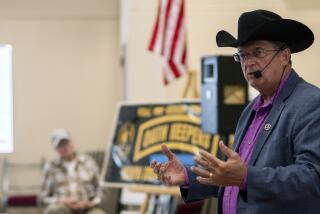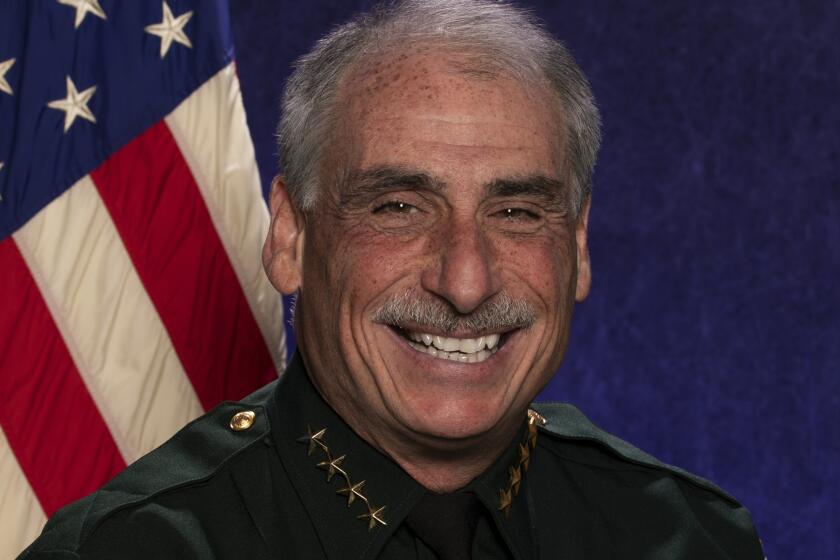Britain Spied on Annan at U.N., Former Official Says
British intelligence agents secretly intercepted conversations of U.N. Secretary-General Kofi Annan in his New York offices last year as the world body weighed U.S. demands for a resolution authorizing an invasion of Iraq, a former member of Prime Minister Tony Blair’s Cabinet said Thursday.
Blair, already under pressure at home for his handling of the war, called the comments “deeply irresponsible” and refused to confirm or deny them.
“Our security services in this country exist for a reason, as they always have done, and that is to protect Britain, to protect this country,” the prime minister said. It would be a “very dangerous situation” if people thought they could just “spill out allegations, whether false or true ... and get away with it.”
The former Cabinet minister, Clare Short, did not say whether the U.S. government was involved in the alleged spying on Annan. A memorandum from the U.S. National Security Agency leaked by a British intelligence worker last year indicated that U.S. officials had planned at least to spy on some U.N. delegations as part of the hard-fought diplomatic battle to get a Security Council resolution authorizing the war.
Appearing Thursday afternoon at the State Department with Bulgarian Foreign Minister Solomon Pasi, Secretary of State Colin L. Powell would not comment on the controversy or say whether alleged U.S. spying at the United Nations extended into Annan’s offices.
“I have nothing to say with respect to the activities of the United Kingdom,” Powell said. “We never talk about intelligence matters of that nature in public.”
Short, who resigned last year as minister for international development over her opposition to the war in Iraq, made her comments on the BBC’s “Today” radio program. She became aware that the British were spying on Annan, she said, because she regularly received accounts of his private conversations. She gave no indication of how Annan’s conversations were obtained.
In an interview Thursday night, Short said she was “troubled” by the spying and considered telling Annan about it.
“I thought about that a lot,” she told Britain’s Channel 4 News. “I thought about saying it to him and I had a dilemma about it.”
Now, she said, “I decided to bring it into the public domain, and that’s what I’ve done.”
At U.N. headquarters in New York, Annan did not directly address the allegations. His spokesman, Fred Eckhard, said phone-tapping or any kind of electronic interference in confidential diplomatic discussions was illegal and, if it was occurring, Annan “would want this practice stopped.”
“Such activities would undermine the integrity and confidential nature of diplomatic exchanges,” Eckhard said. “Those who speak to the secretary-general are entitled to assume that their exchanges are confidential.”
Short’s comments reignited the controversy over whether Blair’s government acted in good faith when it decided to join the U.S.-led invasion of Iraq. They came a day after the government dropped plans to prosecute a government worker who last year leaked a secret request made by the U.S. National Security Agency to Britain to help eavesdrop on six U.N. delegations whose votes were needed for the resolution.
The government declined to prosecute the worker, Katharine Gun, 29, employed by the top-secret Government Communications Headquarters. Gun said she made public the memo from an NSA official named Frank Koza last March because she considered the proposed collaboration wrong and feared that it might bring Britain into what she deemed an illegal war.
The leaked memo outlined U.S. plans to spy on delegations from Angola, Cameroon, Chile, Bulgaria, Guinea and Pakistan -- six Security Council member states considered swing votes on the Iraqi resolution.
American intelligence officials refused to comment Thursday on whether the United States has conducted similar spying operations targeting Annan or other U.N. officials.
But the U.S. has a long-standing practice of spying at the United Nations by planting bugging devices, recruiting sources and intercepting electronic communications, according to former intelligence officials familiar with such operations.
“The United Nations is a caldron of espionage activity,” said a former senior CIA official who had firsthand knowledge of such efforts. Other international bodies, including the International Atomic Energy Agency in Vienna, also are routinely targeted.
The former official said U.S. intelligence services probably would have to get White House approval before targeting a senior official such as Annan.
“I don’t think you’d have a blanket approval to do that kind of thing,” the former official said. “But if there’s a U.S. national interest someone can articulate and defend, I don’t think there’s an administration I ever worked with that wouldn’t be supportive” of such an effort.
He and others said the U.S. was undoubtedly conducting a concerted intelligence-gathering effort during the run-up to the war in Iraq last year. And because diplomats at the United Nations in New York are not U.S. citizens, restrictions on the domestic activities of the National Security Agency -- the huge U.S. organization in charge of eavesdropping and code-breaking -- would not necessarily apply.
Since the suicide of British weapons expert David Kelly in July, Blair has been under almost constant political pressure over the government’s decision to go to war. He has had to defend himself from charges that the intelligence dossier was “sexed up” to make the case for war, survive a judicial inquiry and, most recently, explain why his intelligence services erred so widely in assessing Saddam Hussein’s weapons capabilities, since no weapons of mass destruction have been found.
With a general election next year, Blair has been struggling to shift the public focus to his domestic agenda. To the dismay of his loyalists, the question of Iraq keeps rearing up.
Blair insisted that the decision not to prosecute Gun was made on strictly legal grounds. Lord Goldsmith, the British attorney general, has declined to spell out his reasons for dropping the case.
News that Annan, at the time trying to bridge a deep rift within the Security Council over whether the council should agree to authorize military action in Iraq, was targeted by electronic surveillance did not seem to surprise military and diplomatic experts in London.
Annan’s predecessor, Boutros Boutros Ghali, told the BBC on Thursday that he was constantly aware of attempts to bug his office, home and hotel rooms.
“This is the reality. It’s nothing new,” said the veteran Egyptian diplomat, who was U.N. secretary-general from 1992 to 1996.
Eckhard said Annan has secure phones and faxes and that his offices and phones are routinely checked for bugs. But U.N. security officers will be intensifying their efforts to protect the secretary-general, the spokesman said.
On Thursday morning, Britain’s U.N. ambassador, Emyr Jones Parry, called Annan on behalf of the prime minister, Eckhard said. Although not disclosing details of the conversation, he said, “We’re reaffirming the principle that these premises are inviolable under international law and we expect member states to respect these commitments.”
At his regular monthly news conference Thursday, Blair faced a barrage of questions about his former Cabinet minister’s remarks. He deflected most of them by defending the work of British secret services and saying that no prime minister is at liberty to discuss intelligence operations, “except to say that this country always acts in accordance with domestic and international law.”
He did not conceal an underlying irritation with Short, with whom he has sparred for more than a year because of her outspoken opposition to the war.
“I will say, however, that I really do regard what Clare Short has said this morning as totally irresponsible -- and entirely consistent,” Blair said
Short was unapologetic. “Politicians often get pompous about the security services,” she told the BBC. On TV 4 News, she said she did not believe her disclosures would harm national security or any British spies.
“There is no British national security involved in revealing that Kofi Annan’s private phone calls have been improperly revealed,” she said.
“What will happen is it will stop, and Kofi Annan will have the privacy and respect he should have.”
*
Times staff writer Maggie Farley at the United Nations and Greg Miller in Washington contributed to this report.
More to Read
Sign up for Essential California
The most important California stories and recommendations in your inbox every morning.
You may occasionally receive promotional content from the Los Angeles Times.










